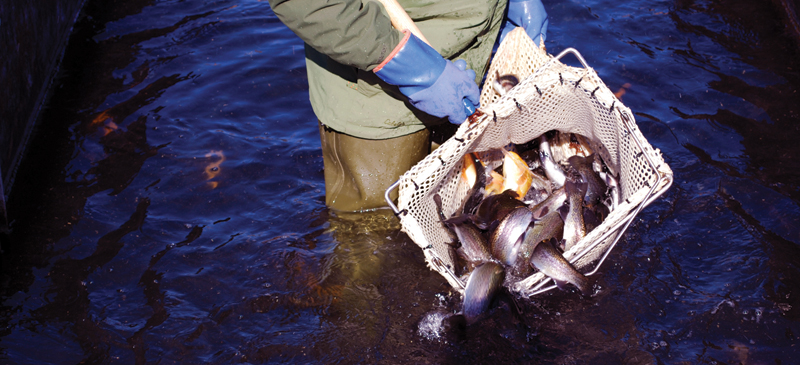Ask an Expert: Spring 2018
Ever wonder why the state stocks trout? Confused about the timing of Arbor Day? Our experts have the answers!

Trout stocking; staff photo
Why does the state stock trout? (Bruno in Funksville)
Trout stocking is conducted in Maryland waters to create sport fishing opportunities and enhance trout populations. Fingerling (juvenile) trout are stocked to support established fisheries and to restore populations that may become depleted from adverse environmental conditions, disease or fishing pressure.
Adult trout are stocked to create recreational fishing opportunities in areas that do not adequately support wild trout populations. Trout stocked as adults are managed under various strategies including put-and-take, reduced harvest and no harvest.
Regional fisheries managers establish trout allocation according to several factors: habitat, local demand, number of fish produced at state hatcheries and water quality.
Scheduled stockings are then established in waters that are capable of supporting populations during appropriate periods of the year. Areas managed for put-and-take fishing typically do not support trout year round, but conditions are suitable during the spring and fall seasons. Each year, approximately 310,000 brown, golden and rainbow trout are stocked during spring and 25,000 during fall. Hatchery trout are not stocked into areas that support native brook trout populations.
Many streams that support trout populations all year are under special management (catch-and-return, zero creel and trophy trout areas). Adoption of short- and long-term management strategies makes efficient use of the Maryland’s diverse habitats and provides increased angling opportunity.
All trout are produced at the Albert Powell, Bear Creek, Cushwa and Mettiki hatcheries. Trout are raised from eggs to various sizes, including three-year-old trophy fish. It takes approximately 13 months for a trout to reach the average stocking size of 10-12 inches. All trout produced in state hatcheries are health tested annually to ensure that they are free of harmful pathogens that cause diseases in fish.
If interested, click here to sign up for daily trout stocking information and other fishing updates.
—Brian Richardson: Fish Health and Hatcheries Program Director, Fishing and Boating Services

Children at Arbor Day planting event; staff photo
Why do we have more than one Arbor Day in Maryland? (J.D. in Perry Hall)
Every state observes Arbor Day, which is celebrated nationally on the last Friday in April. However, each state has also designated their own dates, usually varied by optimal planting times. In Maryland, that’s the first Wednesday in April.
The national celebration has its roots with J. Sterling Morton, a pioneer and journalist. On Jan. 4, 1872, Morton, as a member of the Nebraska Board of Agriculture, appeared before this group to convince them of the wisdom of proclaiming the world’s first Arbor Day.
Despite some criticism and skepticism, the Board approved the plan and, in addition, authorized prizes for the most trees planted on April 10, 1872. Morton’s writings were so accepted and widespread more than one million trees were planted throughout Nebraska that day.
Interest remained high, and two years later, the governor of Nebraska officially designated the second Wednesday in April as Arbor Day. In 1875, the date was changed to April 22 in honor of Morton’s birthday.
For the next several decades, Nebraska would become known as “The Tree Planters State.” Today that state is home to the Arbor Day Foundation. Over time, more states saw the importance of encouraging tree-planting and began adopting their own days. An urban legend says Maryland’s General Assembly additionally picked an earlier date in April so Arbor Day would occur during their session.
In some ways, this day has become a little overshadowed by Earth Day, a more recent commemoration that adopted the April 22 date to celebrate and encourage natural sustainability and environmental protection.
Whether you observe one or more of these celebrations, every day you plant or appreciate a tree is Arbor Day!
—Anne Gilbert: TREE-Mendous Director, Maryland Forest Service
Appears in Vol. 21, No. 2 of the Maryland Natural Resource magazine, spring 2018.

